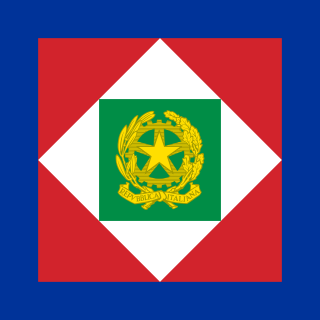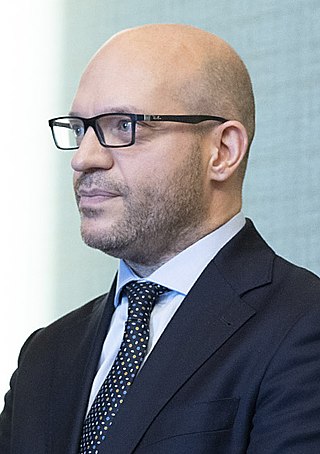| Part of the Politics series |
 |
|---|
| |
Italian general elections determine the composition of the Italian Parliament. [1]
| Part of the Politics series |
 |
|---|
| |
Italian general elections determine the composition of the Italian Parliament. [1]
Elections to the Italian Parliament take place every five years [1] [2] or in the event of its early dissolution.
Currently, both chambers of the Italian Parliament, the Chamber of Deputies and the Senate of the Republic, are elected at the same time by universal and direct suffrage. [1]
147 deputies (members of the Chamber of Deputies) and 74 senators (members of the Senate of the Republic) are elected in single-member constituencies and the rest from party lists. (In addition, there are also several so-called "senators for life". These include former Italian presidents and people appointed by presidential decree in recognition of special service to the country.) [1]
Any Italian citizen over the age of 18 on the election day is eligible to elect the members of the Italian parliament. [3]
In order to be eligible to stand for election to the Chamber of Deputies, an individual must be over the age of 25 on the election day, and in order to be eligible to stand for election to the Senate of the Republic, an individual must be over the age of 40 on the election day. [1]

The Czech Republic is a unitary parliamentary republic, in which the President is the head of state and the Prime Minister is the head of government.
Executive power is exercised by the Government of the Czech Republic which reports to the Chamber of Deputies. The Legislature is exercised by the Parliament. Czech Parliament is bicameral, the upper house of the Parliament is the Senate, the lower house of the Parliament is the Chamber of Deputies. The Senate consists of 81 members who are elected for six years. The Chamber of Deputies consists of 200 members who are elected for four years. The Judiciary system is topped by the trio of Constitutional Court, Supreme Court and Supreme Administrative Court.
The highest legal document is the Constitution of the Czech Republic, complemented by constitutional laws and the Charter of Fundamental Rights and Freedoms. The current constitution went in effect on 1 January 1993, after the Dissolution of Czechoslovakia.

The government of Italy is in the form of a democratic republic, and was established by a constitution in 1948. It consists of legislative, executive, and judicial subdivisions, as well as a Head of State, or President.
A member of parliament (MP) is the representative in parliament of the people who live in their electoral district. In many countries with bicameral parliaments, this term refers only to members of the lower house since upper house members often have a different title. The terms congressman/congresswoman or deputy are equivalent terms used in other jurisdictions. The term parliamentarian is also sometimes used for members of parliament, but this may also be used to refer to unelected government officials with specific roles in a parliament and other expert advisers on parliamentary procedure such as the Senate Parliamentarian in the United States. The term is also used to the characteristic of performing the duties of a member of a legislature, for example: "The two party leaders often disagreed on issues, but both were excellent parliamentarians and cooperated to get many good things done."
President of the Senate is a title often given to the presiding officer of a senate. It corresponds to the speaker in some other assemblies.

The National Assembly is the lower house of the bicameral French Parliament under the Fifth Republic, the upper house being the Senate. The National Assembly's legislators are known as députés, meaning "delegate" or "envoy" in English; etymologically, it is a cognate of the English word deputy, which is the standard term for legislators in many parliamentary systems).

The speaker of a deliberative assembly, especially a legislative body, is its presiding officer, or the chair. The title was first used in 1377 in England.

The president of the Czech Republic is the head of state of the Czech Republic and the commander-in-chief of the Armed Forces of the Czech Republic. The president mostly has ceremonial powers as the day-to-day business of the executive government is entrusted to the prime minister, and since many of the president's actions require prime ministerial approval the ultimate responsibility for the president's conduct lies with the government. However, the president is solely responsible for appointing the prime minister, the Cabinet ministers, as well as the members of the Board of the Czech National Bank, and nominating justices to the Constitutional Court, who are subject to Senate approval, among others.

The Senate of the Republic, or simply the Senate, is the upper house of the bicameral Italian Parliament. The two houses together form a perfect bicameral system, meaning they perform identical functions, but do so separately. Pursuant to the Articles 57, 58, and 59 of the Italian Constitution, the Senate has 200 elective members, of which 196 are elected from Italian constituencies, and 4 from Italian citizens living abroad. Furthermore, there is a small number of senators for life, either appointed or ex officio. It was established in its current form on 8 May 1948, but previously existed during the Kingdom of Italy as Senato del Regno, itself a continuation of the Senato Subalpino of Sardinia established on 8 May 1848. Members of the Senate are styled Senator or The Honourable Senator and they meet at Palazzo Madama, Rome.

The Senate is one of the two chambers of the bicameral Federal Parliament of Belgium, the other being the Chamber of Representatives. It is considered to be the "upper house" of the Federal Parliament. Created in 1831 as a chamber fully equal to the Chamber of Representatives, it has undergone several reforms in the past, most notably in 1993 and 2014. The 2014 elections were the first without a direct election of senators. Instead, the new Senate is composed of members of community and regional parliaments and co-opted members. It is a chamber of the communities and regions and serves as a platform for discussion and reflection about matters between these federated entities. The Senate today plays a minor role in the federal legislative process. However, the Senate, together with the Chamber, has full competence for the Constitution and legislation on the organization and functioning of the Federal State and the federated entities. Since the reform of 2014, it holds about ten plenary sessions a year.
Age of candidacy is the minimum age at which a person can legally hold certain elected government offices. In many cases, it also determines the age at which a person may be eligible to stand for an election or be granted ballot access.

The Italian Parliament is the national parliament of the Italian Republic. It is the representative body of Italian citizens and is the successor to the Parliament of the Kingdom of Italy (1861–1943), the transitional National Council (1945–1946) and the Constituent Assembly (1946–1948). It is a bicameral legislature with 600 elected members and a small number of unelected members. The Italian Parliament is composed of the Chamber of Deputies, as well as the Senate of the Republic.

All elections in the Czech Republic are based on the principle of universal suffrage. Any adult citizen who is at least 18 years old can vote, except those who have been stripped of their legal capacities by a court, usually on the basis of mental illness. Elected representatives are elected directly by the citizens without any intermediaries. Election laws are not part of the constitution, but – unlike regular laws – they cannot be changed without the consensus of both houses of the Parliament. The Czech Republic uses a two-round plurality voting system for the presidential and Senate elections and an open party-list proportional representation system for all other elections. The proportional representation system uses the D'Hondt method for allocating seats.

National-level elections in Italy are called periodically to form a parliament consisting of two houses: the Chamber of Deputies with 400 members; and the Senate of the Republic with 200 elected members, plus a few appointed senators for life. Italy is a parliamentary republic: the President of the Republic is elected for a seven-year term by the two houses of Parliament in joint session, together with special electors appointed by the Regional Councils.

The president of Italy, officially denoted as president of the Italian Republic is the head of state of Italy. In that role, the president represents national unity, and guarantees that Italian politics comply with the Constitution. The president is the commander-in-chief of the Italian Armed Forces and chairs the High Council of the Judiciary. A president's term of office lasts for seven years. The incumbent president is former constitutional judge Sergio Mattarella, who was elected on 31 January 2015, and re-elected on 29 January 2022.

The Chamber of Deputies, officially the Chamber of Deputies of the Parliament of the Czech Republic, is the lower house of the Parliament of the Czech Republic. The chamber has 200 seats and deputies are elected for four-year terms using the party-list proportional representation system with the D'Hondt method. Since 2002, there are 14 constituencies, matching the Czech regions. A Cabinet is answerable to the Chamber of Deputies and the Prime Minister stays in office only as long as they retain the support of a majority of its members. The quorum is set by law to one third (67) of elected deputies. Any changes to the constitutional laws must be approved by at least 60 percent of the Chamber of Deputies. The seat of the Chamber of Deputies is the Thun Palace in Malá Strana, Prague.

The current Constitution of Madagascar was, according to the national electoral commission, endorsed by a majority of voters in the constitutional referendum held on 14 November 2010. The new constitution launched the Fourth Republic of Madagascar and was widely seen as an attempt to consolidate and legitimise the rule of Andry Rajoelina and his High Transitional Authority government which was installed after a military-backed coup d'état against President Marc Ravalomanana at the beginning of the ongoing national political crisis. One substantive change from the constitution of the Third Republic was to lower the minimum age for presidential candidates from 40 to 35. This made Rajoelina, aged 36 at the time, eligible to stand in presidential elections.

The 1999 Italian presidential election was held on 13 May 1999. As a second-level, indirect election, only Members of Parliament and regional deputies were entitled to vote. Carlo Azeglio Ciampi was elected head of state of the Italian Republic, a role of representation of national unity and guarantee that Italian politics comply with the Constitution, in the framework of a parliamentary system.

The president of the Chamber of Deputies is the speaker of the lower house of the Italian Parliament, the Chamber of Deputies. It is the third highest-ranking office of the Italian Republic, after the president of the Republic and the president of the Senate. Since 14 October 2022, the role has been held by Lorenzo Fontana.

The president of the Senate of the Republic is the presiding officer of the Italian Senate. The President of the Senate is the second highest-ranking office of the Italian Republic.